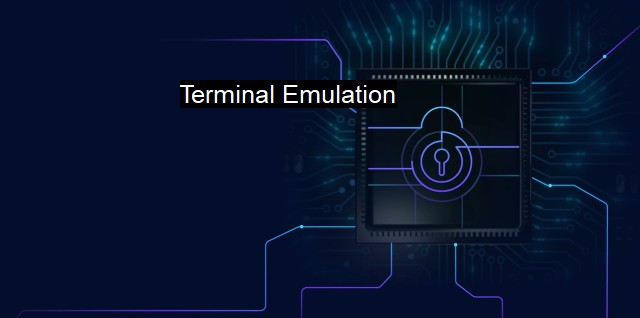What is Terminal Emulation?
Securing Terminal Emulation Technology: Importance of Cybersecurity and Antivirus Measures for Remote Access to Computers
Terminal emulation is a technology utilized in computing to allow one digital system, often referred to as the client device, to replicate the functions of another distinct system, known as the host or server. The most common demonstration of this concept is the reproduction of a hard-copy terminal or a remote terminal that occurs within software. The application that powers this provision is commonly referred to as a terminal emulator. It mimics the functions of traditionally hardware-backed keyboard-video-mouse (KVM) interfaces enabling users to access, manipulate, and perform various tasks on remote computer systems or servers.This technology manifests keenly in cybersecurity and antivirus contexts, playing significant roles that propel the appreciation and use of secure

Terminal Emulation FAQs
What is terminal emulation in the context of cybersecurity and antivirus?
Terminal emulation is a method of accessing a computer's operating system remotely through a secure communication protocol. It enables users to interact with the computer using commands just as they would with a local terminal or console. In the context of cybersecurity and antivirus, terminal emulation can be used to test the security of the system and run virus scans remotely.How does terminal emulation improve cybersecurity and antivirus measures?
Terminal emulation allows for secure and remote access to computer systems, which can reduce the risk of unauthorized access and potential security breaches. It also allows for the running of antivirus scans and tests of the system's security measures without the need for physical access to the machine. This can help identify and address potential security threats in a timely manner.What are some common terminal emulation programs used in cybersecurity and antivirus?
Some of the most common terminal emulation programs used in cybersecurity and antivirus include PuTTY, SecureCRT, and Tera Term. These programs provide secure remote access to computer systems, allowing for the execution of commands, file transfers, and other administrative tasks.Can terminal emulation be used for malicious purposes?
Yes, terminal emulation can be used for malicious purposes such as gaining unauthorized access to computer systems, stealing data, and carrying out cyber attacks. It is important for organizations to have proper security measures in place, such as strong passwords, access controls, and monitoring of remote access to prevent unauthorized or malicious use of terminal emulation.| | A | | | B | | | C | | | D | | | E | | | F | | | G | | | H | | | I | | | J | | | K | | | L | | | M | |
| | N | | | O | | | P | | | Q | | | R | | | S | | | T | | | U | | | V | | | W | | | X | | | Y | | | Z | |
| | 1 | | | 2 | | | 3 | | | 4 | | | 7 | | | 8 | | |||||||